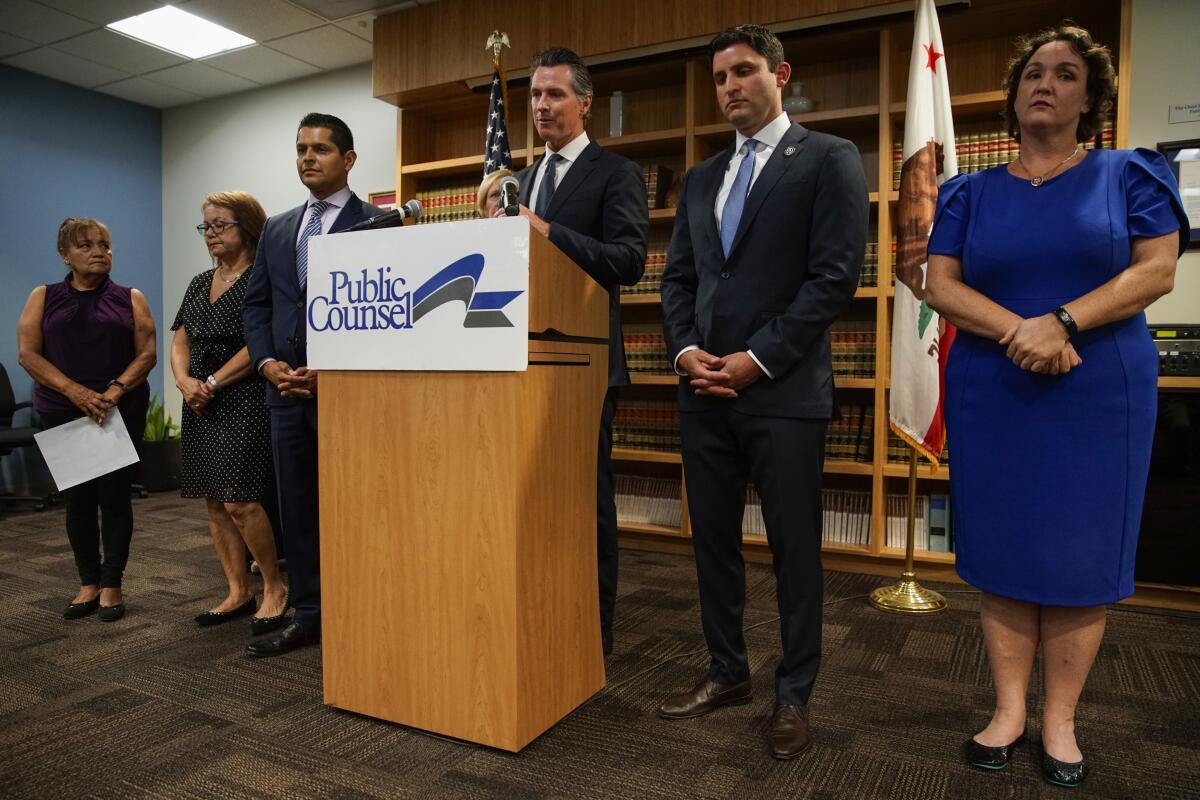Newsom sidesteps right-to-shelter plan, but says homeless on streets ‘cannot persist’

Gov. Gavin Newsom said Wednesday that he wasn’t ready to back a legal “right to shelter” for those without housing, even though the idea was put forward by two key allies who lead his task force to help find solutions to homelessness.
A right-to-shelter measure would force municipalities to construct enough shelter beds so that any homeless person requesting to come indoors can do so.
Newsom’s task force leaders, Los Angeles County Supervisor Mark Ridley-Thomas and Sacramento Mayor Darrell Steinberg, also support a requirement that homeless people be forced to accept shelter if offered, once cities have created adequate shelter capacity.
These policies would transform how California handles its ballooning homeless population. But Newsom, who has made solving the housing and homeless crisis a priority, isn’t ready to fully support the proposal by Steinberg and Ridley-Thomas.
“They need to be provocative. You have to be provocative. I want this debate,” Newsom said at an event in Los Angeles to announce new funding for legal services to help homeowners and renters.
In his first public comments about the proposal, the governor said Steinberg and Ridley-Thomas had reached out to him before their announcement to make sure they weren’t getting out too far in front of him. Newsom said he encouraged them to release the proposal because it is a conversation worth having.
No one has yet fully detailed what a right-to-shelter law in California would look like and how the construction of shelter beds would be funded. Newsom said Wednesday that if a right-to-shelter mandate were to be enacted, the state alone wouldn’t be able to finance building all those shelter beds.
“That’s a fundamental issue that has to be addressed, and we’ve made that clear to the mayor,” he said, referring to Steinberg.
In an op-ed and interview with The Times, Steinberg said he was partially inspired by a legal obligation that’s on the books in New York. The requirement came about in 1981, two years after New York was sued by a man who had been turned away from a homeless shelter because of a lack of space.
“We have a long-term plan to build housing for people who are unsheltered,” Steinberg said in an interview at the time, “but we cannot continue with the reality that while we fix this problem that we are OK with 90,000 people being on the street.”
Advocates in New York say this sort of requirement can be lifesaving, because homeless people are indoors during cold winters and hot summers can be deadly. Even in L.A., where sunshine and mild temperatures are typical, more people died of causes related to hypothermia last year than in New York City.
Homeless service workers in Los Angeles said any law forcing people into shelter would make it harder to bring people off the streets.Resources to build any kind of housing are tight, they added, and the money is better spent on building something that can permanently house people.
“The cost is so high to keep people housed in shelters that there won’t be enough money on the back end” for permanent housing, Kris Freed of LA Family Housing told The Times recently. “I understand the frustration from the public … and we get calls every day from homeowners where encampments are. But we’re moving people into housing faster than ever.”
In January, New York City’s point-in-time count recorded 3,588 unsheltered individuals. But on a given night, about 58,000 homeless people sleep indoors in shelters, hotel rooms or run-down private apartments for which the city pays billions to keep up.
In California, 90,000 of the state’s 130,000 homeless people are unsheltered, and politicians are becoming increasingly vocal about those numbers as the government tries to figure out how to build more housing.
Newsom on Wednesday echoed these sentiments.
“We want to do the right thing, but living out on the streets and sidewalks … that cannot persist. And so this is a good debate, but it’s one of many things we need to debate,” he said, adding that “there’s compassion fatigue out there.”
More to Read
Sign up for Essential California
The most important California stories and recommendations in your inbox every morning.
You may occasionally receive promotional content from the Los Angeles Times.











